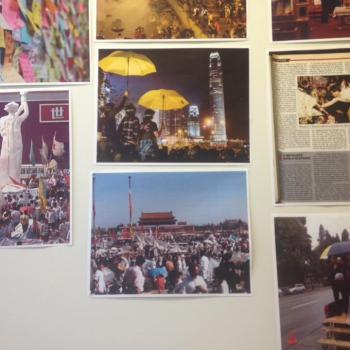Some time ago, I raised the issue on this Thing that we need a feminist theologian. You could say that we now have one, although I’m sure that Not a Dinner Party’s views are not quite as radical as Mary Daly’s, Elisabeth Schüssler Fiorenza’s, Rosemary Radford Ruether’s, or Rita Nakashima Brock’s. (Or perhaps they are, which would be very interesting indeed). Instead, Not a Dinner Party’s rant ostensibly places her in the same camp as those who have been labeled ‘evangelical feminists.’ What is striking about this is that even as Not a Dinner Party admits that she too has moved from a sort of Reformed evangelical confession to high-church Anglo-Catholic practice, so have some evangelical feminist bloggers like Rachel Held Evans and Sarah Bessey, to some extent for each, at least in their personal contemplative practices. If there are two sides of the same reactionary coin with regard to complementarian and patriarchal models of gender roles, there may be two sides of the same feminist coin as well.
Since Not a Dinner Party raised the possibility of the patriarchal reactionary coin, I will leave her to address this hypothesis of the feminist coin in her further reflections on this Thing.
My aim in this post is instead to celebrate the arrival of our second Chinglican on this blog. I regret to have not been able to proceed further with the ‘What’s So Good About Being Anglican?‘ series before writing this post, for I do plan to write an exposition of the Anglican charism in part 4 and of Chinglicanism in part 5. But if my post on Justin Cantuar and the Cursillo Movement was a preview of sorts into the nature of part 4, consider this appreciation of what Not a Dinner Party stands for as a preview of sorts into part 5’s more drawn out discussion of what it means to be a Chinglican.
I want to write about Not a Dinner Party’s admission that she is interested in all things China. To make such an admission may put her into the ranks of white missionary women who were very interested in China in the late nineteenth and early twentieth centuries. Some of these women did not make it all the way to China; instead, some like Donaldina Cameron (Presbyterian Church in Chinatown, San Francisco) and Celia ‘Debbie’ Allen (First Chinese Baptist Church, San Francisco) mentored youth, alleviated poverty, and combated domestic violence in American Chinatowns.
Indeed, there is a fairly clear trajectory that runs from the work of these white missionary women in Chinatowns and the liberation movements of Chinese American youth combating racism and Chinese segregation since the 1930s Tahoe Conferences, efforts that eventually culminated in calls for social justice from the National Council of Churches’s National Conference of Chinese American Churches (CONFAB) and the joining of mainline Chinese churches with the War on Poverty and the ethnic studies strikes in the 1960s and 1970s, through which seminal organizations like Self-Help for the Elderly, the Chinese Hospital, and the Mei Lun Yuen Housing Project were started. While some Asian American scholars are somewhat ambivalent about the sort of imposition of whiteness onto Chinese spaces by these missionary women, many Asian Americanists themselves often laud these white missionary women as prototypical anti-racist feminists in Chinatown (see, for example, Peggy Pascoe’s Relations of Rescue, Judy Yung’s Unbound Feet, and Derek Chang’s Citizens of a Christian Nation; for a critique, see Henry Yu’s Thinking Orientals). That I know Not a Dinner Party to have worked in Chinese immigrant services and anti-poverty work on both the West and East Coasts may well indicate that she is following in this long legacy.
Yet even that is not the subject of this particular post, though we may well come back to these themes in the future.
What I want to discuss here is the influence that white Anglicans who study China, including Not a Dinner Party, have had on my thinking on Anglicanism. This is thus not an introduction to Not a Dinner Party, as if she needed one and had to work off a complementarian model where she speaks only under authority on this Thing. I am not introducing her. I am appreciating her.
As you will see from her more formal introduction on her Tumblr, Not a Dinner Party takes her name from Chinese Communist Party chairman Mao Zedong’s quip that ‘a revolution is not a dinner party.’ For some, this explicit invocation of Maoist ideology may be alarming, as it may suggest that there are some of us whose radical critiques may stem from secular socialist sources.
Yet if there is anything that Anglicans who study China, including Not a Dinner Party, have taught me, it is that we must categorically refuse to see China as the ‘other’ to the West. Timothy Cheek is one of these Anglicans. A scholar of Chinese intellectual history both in the Republican and Communist periods, Cheek writes in his introduction to relations between China and the West, China since 1989: Living With Reform, that especially those who do America-China relations often fixate on China as the ‘other’ without realizing that this binary geopolitical framework feeds deeply into how an American national consciousness is conceptualized. If this is the case, Cheek argues, then we need to understand China rightly. Throughout his work, then, Cheek makes the case that we need to understand that saying that ‘Mao is a bad man’ is not enough; we actually have to unpack who Mao was, who the intellectuals both for and against Mao were, who the intellectuals and the political leaders of the Republican era were, who the intellectuals and the political leaders of the post-Mao Reform era were, etc. Moreover, Cheek emphasizes that there is a ‘historical Mao’ who actually did things that were good and bad, as well as an ahistorical ‘living Maoism’ that endures today that places Mao as a mythologically good and evil figure in modern China. Seen in this way, China isn’t this big totalitarian land mass over there. Instead, borrowing from the Yale historian of China, Jonathan Spence, it’s a concerted ‘search for modern China,’ examining what we know as ‘China’ as a complex, modern political and economic set of systems whose activities are integral to international politics.
Cheek is not the only one doing such things, especially at the University of British Columbia at Vancouver’s Institute of Asian Research, where much of this complex political economic analysis of Asia-Pacific nation-states takes place in its various centres under leading scholars (both emeriti and contemporary) like Terry McGee, David Edgington, Abidin Kusno, Michael Leaf, Alison Bailey, and Tsering Shakya. To be sure, not everyone here is an Anglican. But the China scholars, like Tim Cheek, disproportionately are, for other scholars, such as Pitman Potter (a China law professor who has recently been ordained in the Anglican Church of Canada) and Diana Lary (an emerita professor of modern Chinese history, with interests particularly in Hong Kong, and who is a latitudinarian Anglican laywoman) certain are Anglican as well as leading China scholars. These scholars also take a similar view of China, refusing to frame it as a backward geopolitical ‘other’ but as a complex, modern apparatus with thriving public and private spheres and vibrant intellectual activity both for and against the state.
It’s here that Not a Dinner Party fits, and the fact that both her partner and I were both students supervised by Tim Cheek for our undergraduate history theses makes this point all the more poignant. (Parallels aside, however, her partner is much more mature in a Christian sense than I am–evidenced by his conversations with me when we were in history together–and whose emphasis on actually doing poverty work and working for social justice puts me to shame.) As a white woman interested in all things China, Not a Dinner Party’s command of Mandarin Chinese, both spoken and written, routinely makes me defer to her for translation, and her knowledge of the Chinese state apparatus and civil society usually means that it’s usually I who consult her for my knowledge of China.
But these people’s deep knowledge of modern China is not the point of this post. It is that this approach to China–one that emphasizes complex alterity in contrast to Cold War ideologies–seeps into their practice of Anglicanism and has deeply influenced the way that I understand Chinglicanism.
If anything, these sorts of approaches to China are far from anything orientalist. While Churl complains in a previous post that Catholicism may be Anglicanism’s ‘Orient,’ I’d like to propose that the alternative to that lies somewhere in Not a Dinner Party’s approach to China. Indeed, Edward Said made it clear in Orientalism that what he was critiquing was not that the ‘orient’ was being studied by ‘occidentalist’ scholars, but instead that ‘occidentalist’ scholars’ methodologies tended to frame the ‘orient’ as a monolithic whole without bothering to actually engage the region of the world called the ‘Orient’ in all of its complexity. The answer to Said is not to stop studying ‘Asia’ or ‘China’; it is to represent it as complex. And this is what these Anglican scholars of China do: instead of seeing the ‘other’ as a fascinating, exotic, but backward monolithic wholes, they examine China as very much a part of who we are and as a complex state apparatus straddling a very complicated economy with multiple publics and counterpublics vying for their voice to be heard. This is China; this is also Catholicism, with its very complicated hierarchy, its fascinating financial exchanges, and its various factions duking it out. What the Anglicans who study China have taught me is that while it may be geopolitically convenient to posit the ‘other’ as ‘wholly other,’ such an approach is neither a fair representation of the other’s complexity, nor an accurate view of how the ‘other’ constitutes our very selves, nor a good way to advance conversation that will lead to the ever increasing collegiality, communion, brotherhood, and sisterhood to which all Christians led by the Spirit are called.
This is what makes Not a Dinner Party’s initial rant on this Thing so on point. What she is pointing out to us is that Catholicism is not one thing. However, the reduction of the neo-Reformed converts running to Catholicism belies what she facetiously calls ‘orientalist’ bells and smells: they reduce Catholicism to one thing. She might declare to us that she herself is a ‘single issue voter’ on the subject of women’s ordination, but she goes on to say that ‘I think the trend is particularly troubling, beyond the gender questions, because the gender questions bring up something larger, i.e. things that become problematic when you go in this direction.’ One may read her as repeating the same ‘slippery slope’ arguments presented by John Piper in the Gospel Coalition video on complementarianism that she posted, only running in the opposite direction.
The only trouble is, a ‘slippery slope’ is not what Not a Dinner Party is talking about.
Not a Dinner Party is saying that it is troubling that when neo-Reformed converts go over to Catholicism, they reduce Catholicism via their narrow view of gender complementarity that only represents one wing (albeit the dominant wing, including in the magisterium) of the Catholic conversation. One wonders, for example, whether their Catholicism is big enough to include the Leadership Conference of Women Religious (LCWR) or other conferences of women religious, to whom, by the way, Pope Francis went out of his way to say that they should keep doing what they are doing even if they are investigated by the Congregation for the Doctrine of the Faith (CDF), the same CDF formerly headed by a certain Joseph Cardinal Ratzinger who declared while still in office that whatever disagreements he had with Elisabeth Schüssler Fiorenza and her ‘radical feminist’ friends (which he unfortunately declared ‘another religion’), he considered her an important and thoughtful exegete. One wonders whether their Catholicism is big enough to recognize that liberation theology movements are now being vindicated by Pope Francis as part of the magisterium and that the Church has always had an ‘option for the poor,’ in which framework the free market advocates such as George Weigel, Michael Novak, Robert George, Richard John Neuhaus, and Paul Ryan with their subsidiarity arguments sound more neoliberal than Catholic. One wonders whether these people, instead of reading First Things, have been tempted by the free student subscription to Commonweal. If indeed there are single issue voters, Not a Dinner Party seems to be suggesting that it is these neo-Reformed converts.
And all of this can probably be traced back to Not a Dinner Party’s commitment to an Anglicanism that does not frame China as the monolithic other. In fact, one can only see that the neo-Reformed and conservative Catholic converts are two sides of the same reactionary coin from the vantage point of commitment to analyses that unpack modern complexity, for it is only from that perspective that one can point out reductionism in all of its insidious forms. Just as China should not be reduced to living Maoism (though that is certainly there), Catholicism should not be reduced to the magisterium (though it certainly has a place).
What do we call that vantage point in the Christian church? Well, Not a Dinner Party and I would call it ‘Anglicanism.’ Or better put, it’s called ‘Chinglicanism,’ because we realize that it’s a particular kind of Anglicanism that we are talking about here, one that is not interested in propping up the old colonial structures of the British Empire as it sets up racial hierarchies and segregated urban developments all over the world, but rather, one that realizes that the parish charism does not even allow for a strict spatial differentiation between the ‘church’ and the ‘world.’ It should, after all, be little surprise that the progenitors of ‘radical orthodoxy’ like John Milbank and some of their critical post-liberal allies like Rowan Williams and Stanley Hauerwas are also Anglicans who argue that that very spatial differentiation between the ‘church’ and the ‘world’ is itself a secular construct. As Milbank points out from the get-go in Theology and Social Theory, the saeculum as it has been traditionally conceptualized in Christian theology is not a place; it’s a time, a reference to the ordinary time between Christ’s first and second parousia. In this way, the spatial boundaries of the church are artificial, for the church is a display of an alternate but radically true ontology of radical communion, hospitality, and forgiveness in the midst of a violent world that erects and polices borders all over the place. It’s only in this context that Hauerwas’s mandate to make the church ‘the church’ and the world ‘the world’ makes sense: he is not talking about a physical spatial differentiation, but a radically ontological one in which the church and the world co-exist and where the church’s practices in the midst of the world threatens the world’s legitimacy as an ontological construct. That’s a deep articulation of the parish charism, that is to say, that the Anglican parish exists in the midst of a world that seeks to co-opt it because it doesn’t place those boundaries around itself, but where it ideally–and never completely successfully–displays an alternate mode of charitable social relations in the midst of a violent world.
Chinglicanism extends that parish charism and says that even imperial Anglicanism’s ultimate ‘other’–the ‘Orient,’ ‘Asia,’ or more precisely, ‘China,’ as well as ‘Catholicism’–must not be understood in the terms of colonial segregation or uncritical geopolitical posturing because that is a betrayal of the parish charism itself. It recognizes instead that a parish charism shows us what it means to be constituted by the ‘other,’ that our communion is deeper than we ever imagined, and that this communion is not easy and is in fact all too easily shattered by elitist political posturing. It requires us all to recognize that the ‘poor,’ the ‘Chinese,’ and the ‘Catholic’ are not others to be labeled and pushed away, but rather that we are all part of this parish together.
Not a Dinner Party is thus a Chinglican, for we both refuse to understand the ‘other,’ be it China or Catholicism, in static terms or even as apart from the constitution of our own existence, for doing so would be a violation of Anglican Christian practice altogether. Indeed, to the extent that I have committed these errors, Not a Dinner Party has often corrected me. In this way, she reminds me always that I must be a better Chinglican, for in practicing my Chinglican charism, I am contributing my share to the church catholic that we may all be irreducibly one.












